Exosome release of β-catenin: a novel mechanism that antagonizes Wnt signaling
- PMID: 20837771
- PMCID: PMC3101591
- DOI: 10.1083/jcb.201002049
Exosome release of β-catenin: a novel mechanism that antagonizes Wnt signaling
Abstract
CD82 and CD9 are tetraspanin membrane proteins that can function as suppressors of tumor metastasis. Expression of CD9 and CD82 in transfected cells strongly suppresses β-catenin-mediated Wnt signaling activity and induces a significant decrease in β-catenin protein levels. Inhibition of Wnt/β-catenin signaling is independent of glycogen synthase kinase-3β and of the proteasome- and lysosome-mediated protein degradation pathways. CD82 and CD9 expression induces β-catenin export via exosomes, which is blocked by a sphingomyelinase inhibitor, GW4869. CD82 fails to induce exosome release of β-catenin in cells that express low levels of E-cadherin. Exosome release from dendritic cells generated from CD9 knockout mice is reduced compared with that from wild-type dendritic cells. These results suggest that CD82 and CD9 down-regulate the Wnt signaling pathway through the exosomal discharge of β-catenin. Thus, exosomal packaging and release of cytosolic proteins can modulate the activity of cellular signaling pathways.
Figures
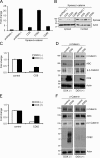
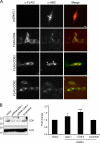

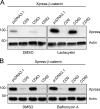
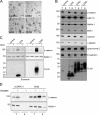

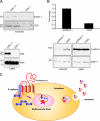
Comment in
-
Tumour suppression: Ejector seat.Nat Rev Cancer. 2010 Nov;10(11):739. doi: 10.1038/nrc2951. Nat Rev Cancer. 2010. PMID: 21080585 No abstract available.
References
-
- Boucheix C., Duc G.H., Jasmin C., Rubinstein E. 2001. Tetraspanins and malignancy. Expert Rev. Mol. Med. 2001:1–17 - PubMed
Publication types
MeSH terms
Substances
Grants and funding
LinkOut - more resources
Full Text Sources
Other Literature Sources
Miscellaneous

